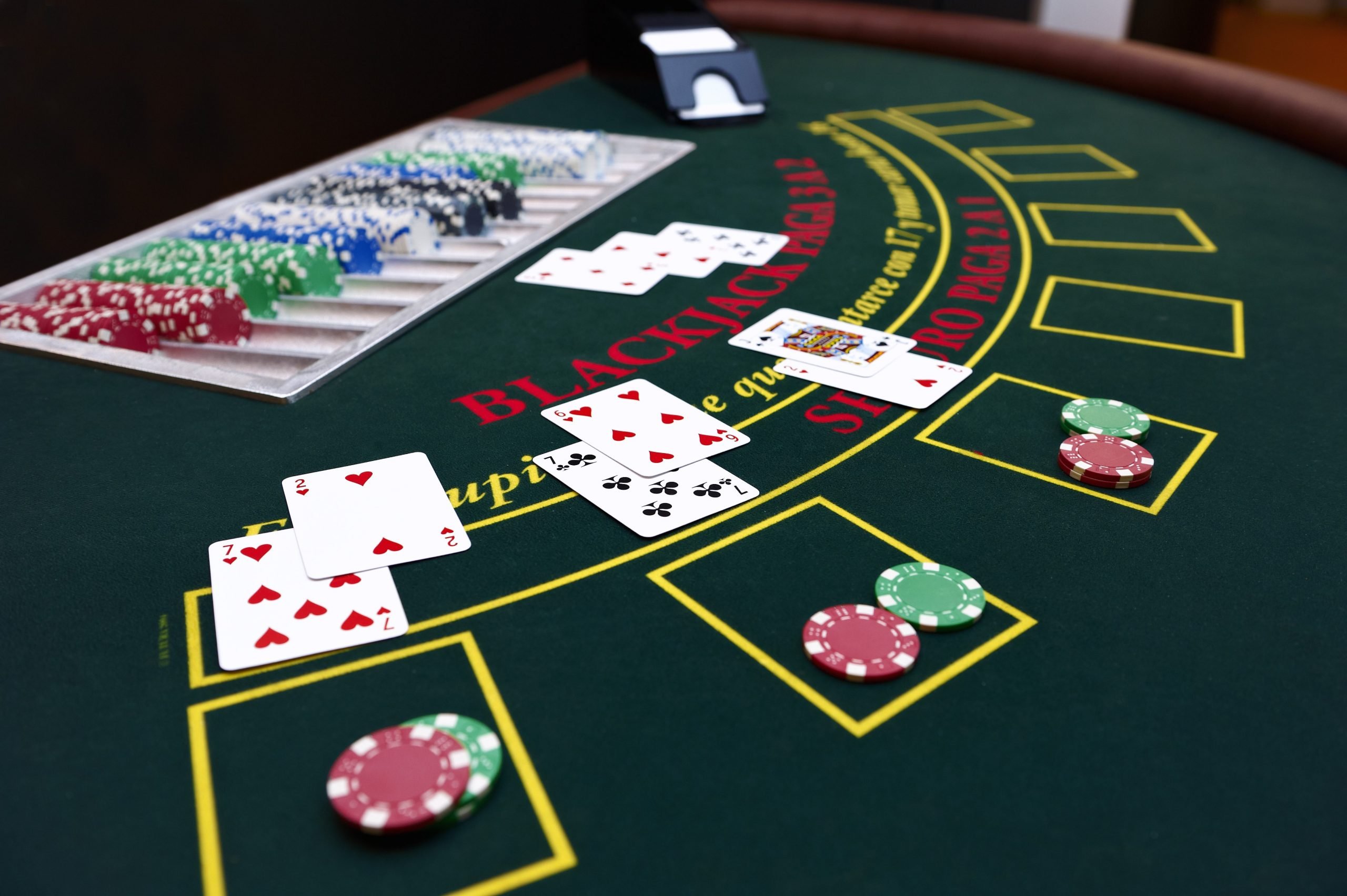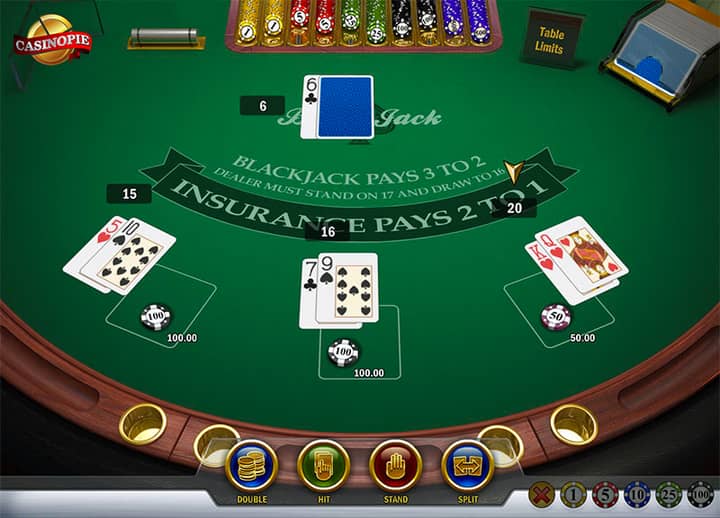Blackjack is one of the most popular casino games in the world. It is a simple yet exciting game that can be played by anyone. Whether you are a seasoned gambler or a beginner, blackjack offers a thrilling experience that keeps players coming back for more.
The objective of the game is to have a hand that is closer to 21 than the dealer’s hand, without going over 21. The game is played with a deck of 52 cards, and each card has a point value attached to it. The numbered cards are worth their face value, while the face cards (King, Queen, Jack) are worth 10 points each. The Ace can be worth either 1 or 11 points, depending on what is more beneficial for the player.
The gameplay of blackjack is quite simple. The dealer deals two cards to each player and two cards to themselves. The players can see their own cards, but only one of the dealer’s cards is visible. The players then have the option to hit (draw another card), stand (keep their current hand), double down (double their initial bet and receive one more card), or split (if they have two cards of the same value, they can split them into two separate hands).
Blackjack is a game that requires both skill and luck. Players need to make strategic decisions based on the cards they see on the table, as well as the dealer’s visible card. The goal is to make the best possible hand without going over 21. By learning the basic rules and strategies of blackjack, players can maximize their chances of winning and have an enjoyable time at the casino.
How to Play Blackjack
Blackjack is a popular card game that is played in casinos worldwide. The objective of the game is to beat the dealer by getting a hand value as close to 21 as possible without exceeding it. In this article, we will go over the basic rules and gameplay of blackjack to help you get started.
To begin the game, each player is dealt two cards face up, while the dealer receives one card face up and one card face down. The value of each card is as follows: numbered cards are worth their face value, face cards (King, Queen, and Jack) are worth 10, and the Ace can be worth either 1 or 11, depending on what is more beneficial for the player.
The gameplay:
-
Each player has the option to either “hit” or “stand”.
-
To “hit” means to request another card from the dealer to try and improve your hand.
-
To “stand” means to keep your current hand and not request any additional cards.
After all the players have made their decisions, the dealer reveals their face-down card. The dealer must follow a set of rules that determine their actions. Typically, the dealer must hit until they reach a hand value of 17 or higher. If the dealer’s hand exceeds 21, they “bust” and all remaining players win.
When determining the winner:
-
If a player’s hand value exceeds 21, they “bust” and lose automatically, regardless of the dealer’s hand.
-
If a player’s hand value is closer to 21 than the dealer’s hand, they win and receive a payout.
-
If the player’s hand value is the same as the dealer’s, it is a “push” and the player’s bet is returned.
It is important to note that there are additional options and variations in blackjack, such as splitting pairs, doubling down, and taking insurance. Familiarize yourself with these rules and strategies to enhance your gameplay. Remember, the goal of blackjack is to have fun and make strategic decisions based on the cards you are dealt.
Rules of Blackjack
In the game of Blackjack, the main objective is to have a hand with a higher total value than the dealer’s hand without exceeding a total of 21. Each card in the deck has a specific value: cards 2-10 are worth their face value, face cards (Jack, Queen, King) are worth 10, and an Ace can be worth either 1 or 11.
To start the game, each player is dealt two cards face up, while the dealer receives one card face up and one card face down. The player’s cards are added together to determine the hand’s total value. The player then has the option to “hit” (request an additional card) or “stand” (keep their current hand) in an attempt to reach a total value closer to 21 without going over.
If the player’s hand exceeds a total value of 21, they go bust and automatically lose the round. If the player decides to stand, it is then the dealer’s turn to reveal their face-down card and decide their next move. The dealer must follow specific rules when playing their hand. Usually, the dealer must hit if their hand value is 16 or lower and stand if it is 17 or higher.
After the dealer has played their hand, the values of the player’s and dealer’s hands are compared. If the player’s hand is higher, they win and receive a payout equal to their original bet. If the dealer’s hand is higher or both hands have the same value, the player loses their bet. In some cases, if the player’s initial two cards have a total value of 21 (an Ace and a 10-value card), they have a “blackjack” and win 1.5 times their bet.
Gameplay of Blackjack
In the game of Blackjack, also known as twenty-one, the objective is to beat the dealer’s hand without going over a total of 21. Players compete against the dealer, not each other. The game begins with each player receiving two cards, face up, while the dealer receives one card face up and one card face down.
After receiving their initial two cards, players have several options they can choose from to improve their hand. They can choose to “hit”, which means they request an additional card from the dealer. If the player’s hand exceeds 21 after hitting, they bust and lose the round. Alternatively, players can choose to “stand”, which means they do not want any more cards and are satisfied with their current hand.
Another option available to players is to “double down”. This allows them to double their initial bet, receive one additional card, and then automatically stand. It is a strategic move that can be used when a player feels confident that their hand will beat the dealer’s. Another move is to “split” pairs, which means if a player receives two cards of the same rank, they can choose to split them into two separate hands. Each hand is then played independently, and a bet equal to the original is placed on the second hand.
Once all players have completed their actions, the dealer reveals their face-down card. In Blackjack, the dealer must follow a specific set of rules. Typically, if the dealer’s hand is 16 or less, they must hit until their hand reaches 17 or higher. If the dealer’s hand exceeds 21, they bust, and all remaining players win. If the dealer’s hand is higher than the player’s hand without exceeding 21, the player loses their bet. If the player’s hand is higher than the dealer’s hand without exceeding 21, they win.
In summary, the gameplay of Blackjack involves players making strategic decisions to achieve a hand value as close to 21 as possible without going over, while also considering the dealer’s exposed card. It requires both luck and skill to navigate the game successfully and come out ahead.
Tips and Strategies for Playing Blackjack
While blackjack is a game of chance, there are some tips and strategies that can help improve your odds of winning. Here are some key points to keep in mind when playing blackjack:
1. Learn the basic strategy: The basic strategy is a set of rules that tells you the best move to make in any situation based on the cards you have and the card the dealer is showing. Knowing and using the basic strategy can significantly reduce the house edge and improve your chances of winning.
2. Manage your bankroll: Set a budget for your blackjack session and stick to it. It’s important to only gamble with money you can afford to lose. Avoid chasing losses and don’t bet more than you’re comfortable with.
3. Avoid insurance bets: Insurance bets may seem tempting when the dealer has an Ace, but statistically, they are not a good bet in the long run. It’s generally best to avoid taking insurance.
4. Pay attention to the dealer’s card: The dealer’s up card can give you valuable information about their hand. Use this information to make informed decisions about your own strategy.
5. Don’t rely on card counting: Card counting is a strategy that involves keeping track of the cards that have been dealt to gain an advantage. While it can be effective, card counting is not practical for most players and is not guaranteed to result in consistent wins.
6. Practice online before playing at a casino: Many online casinos offer free blackjack games where you can practice and familiarize yourself with the game rules and strategies. This can be a great way to improve your skills before playing for real money.
Remember, blackjack is still a game of chance, and there is no guaranteed way to win. These tips and strategies can help improve your odds, but ultimately, luck plays a significant role in the outcome. Play responsibly and enjoy the game!


